
- •Contents
- •Thanks
- •To the student
- •To the teacher
- •3 Present continuous and present simple 1 (I am doing and I do)
- •10 Present perfect continuous and simple (I have been doing and I have done)
- •11 how long have you (been) … ?
- •12 for and since when … ? and how long … ?
- •13 Present perfect and past 1 (I have done and I did)
- •14 Present perfect and past 2 (I have done and I did)
- •15 Past perfect (I had done)
- •16 Past perfect continuous (I had been doing)
- •17 have and have got
- •18 used to (do)
- •19 Present tenses (I am doing / I do) for the future
- •20 I’m going to (do)
- •21 will and shall 1
- •22 will and shall 2
- •23 I will and I’m going to
- •24 will be doing and will have done
- •26 can, could and (be) able to
- •27 could (do) and could have (done)
- •28 must and can’t
- •29 may and might 1
- •30 may and might 2
- •31 have to and must
- •32 must mustn’t needn’t
- •33 should 1
- •34 should 2
- •35 I’d better … it’s time …
- •36 would
- •39 if I knew … I wish I knew …
- •40 if I had known … I wish I had known …
- •41 wish
- •42 Passive 1 (is done / was done)
- •43 Passive 2 (be done / been done / being done)
- •44 Passive 3
- •45 it is said that … he is said to … he is supposed to …
- •46 have something done
- •47 Reported speech 1 (he said that …)
- •48 Reported speech 2
- •49 Questions 1
- •52 Question tags (do you? isn’t it? etc.)
- •53 Verb + -ing (enjoy doing / stop doing etc.)
- •54 Verb + to … (decide to … / forget to … etc.)
- •55 Verb (+ object) + to … (I want you to …)
- •56 Verb + -ing or to … 1 (remember, regret etc.)
- •57 Verb + -ing or to … 2 (try, need, help)
- •58 Verb + -ing or to … 3 (like / would like etc.)
- •59 prefer and would rather
- •60 Preposition (in/for/about etc.) + -ing
- •61 be/get used to … (I’m used to …)
- •63 there’s no point in -ing, it’s worth -ing etc.
- •64 to … , for … and so that …
- •65 Adjective + to …
- •66 to … (afraid to do) and preposition + -ing (afraid of -ing)
- •67 see somebody do and see somebody doing
- •68 -ing clauses (He hurt his knee playing football.)
- •69 Countable and uncountable 1
- •70 Countable and uncountable 2
- •71 Countable nouns with a/an and some
- •74 the 2 (school / the school etc.)
- •75 the 3 (children / the children)
- •77 Names with and without the 1
- •78 Names with and without the 2
- •79 Singular and plural
- •80 Noun + noun (a bus driver / a headache)
- •81 -’s (your sister’s name) and of … (the name of the book)
- •82 myself/yourself/themselves etc.
- •83 a friend of mine my own house on my own / by myself
- •84 there … and it …
- •85 some and any
- •87 much, many, little, few, a lot, plenty
- •90 all every whole
- •91 each and every
- •92 Relative clauses 1: clauses with who/that/which
- •94 Relative clauses 3: whose/whom/where
- •95 Relative clauses 4: extra information clauses (1)
- •96 Relative clauses 5: extra information clauses (2)
- •97 -ing and -ed clauses (the woman talking to Tom, the boy injured in the accident)
- •98 Adjectives ending in -ing and -ed (boring/bored etc.)
- •99 Adjectives: a nice new house, you look tired
- •100 Adjectives and adverbs 1 (quick/quickly)
- •102 so and such
- •104 quite, pretty, rather and fairly
- •105 Comparative 1 (cheaper, more expensive etc.)
- •106 Comparative 2 (much better / any better etc.)
- •107 Comparative 3 (as … as / than)
- •108 Superlative (the longest / the most enjoyable etc.)
- •109 Word order 1: verb + object; place and time
- •110 Word order 2: adverbs with the verb
- •111 still any more yet already
- •112 even
- •114 in case
- •116 as (as I walked … / as I was … etc.)
- •117 like and as
- •119 during for while
- •121 at/on/in (time)
- •122 on time and in time at the end and in the end
- •123 in/at/on (position) 1
- •124 in/at/on (position) 2
- •125 in/at/on (position) 3
- •126 to, at, in and into
- •127 in/on/at (other uses)
- •129 Noun + preposition (reason for, cause of etc.)
- •130 Adjective + preposition 1
- •131 Adjective + preposition 2
- •132 Verb + preposition 1 to and at
- •134 Verb + preposition 3 about and of
- •135 Verb + preposition 4 of/for/from/on
- •136 Verb + preposition 5 in/into/with/to/on
- •137 Phrasal verbs 1 Introduction
- •138 Phrasal verbs 2 in/out
- •139 Phrasal verbs 3 out
- •142 Phrasal verbs 6 up/down
- •143 Phrasal verbs 7 up (1)
- •144 Phrasal verbs 8 up (2)
- •145 Phrasal verbs 9 away/back
- •Additional exercises
- •Study guide
- •Key to Exercises
- •Key to Additional exercises (see page 302)
- •Key to Study guide
- •Index
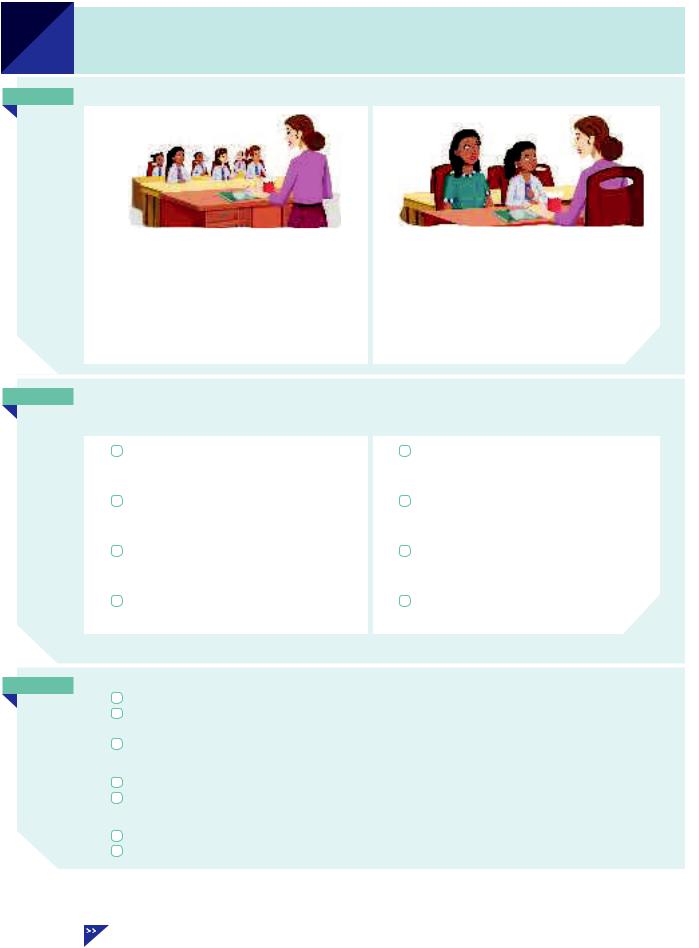
Unit
74 the 2 (school / the school etc.)
ACompare school and the school:
ELLIE
Ellie is ten years old. Every day she goes to school. She’s at school now. School starts at 9 and finishes at 3.
We say a child goes to school or is at school (as a student). We are not thinking of a specific school. We are thinking of school as a general idea – children learning in a classroom.
Today Ellie’s mother wants to speak to her daughter’s teacher. So she has gone to the school to see her. She’s at the school now.
Ellie’s mother is not a student. She is not ‘at school’, she doesn’t ‘go to school’. If she wants to see Ellie’s teacher, she goes to the school (= Ellie’s school, a specific building).
BWe use prison (or jail), hospital, university, college and church in a similar way. We do not use the when we are thinking of the general idea of these places and what they are used for.
Compare:
When I leave school, I plan to go to university / go to college. (as a student)
Joe had an accident last week. He was taken to hospital. He’s still in hospital now. (as a patient)
Ken’s brother is in prison for robbery. (He is a prisoner. We are not thinking of a specific prison.)
Sarah’s father goes to church every Sunday. (for a religious service)
I went to the university to meet Professor Thomas.
(as a visitor, not as a student)
Jane has gone to the hospital to visit Joe. She’s at the hospital now.
(as a visitor, not as a patient)
Ken went to the prison to visit his brother. (He went as a visitor, not as a prisoner.)
Some workmen went to the church to repair the roof. (a specific building)
With most other places, you need the. For example, the station, the cinema (see Units 72C and 73D).
CWe say go to bed / be in bed etc. (not the bed):
I’m going to bed now. Goodnight.
Do you ever have breakfast in bed?
but
I sat down on the bed. (a specific piece of furniture)
go to work / be at work / start work / finish work etc. (not the work):
Chris didn’t go to work yesterday. What time do you usually finish work?
go home / come home / arrive home / get home / be (at) home / do something at home etc. :
It’s late. Let’s go home.
I don’t go out to work. I work at home.
|
the Units 72–73, 75–78 Prepositions (at school / in hospital etc.) Units 123–125 |
148 |
home Unit 126C American English Appendix 7 |

Exercises
74.1 Complete the sentences with school or the school.
1 |
Why aren’t your children at school |
today? Are they ill? |
|
2 |
When he was younger, Ben hated |
|
, but he enjoys it now. |
3 |
There were some parents waiting outside |
to meet their children. |
|
4 |
What time does |
start in the morning? |
|
5 |
How do your children get to and from |
|
? Do you take them? |
6 |
What was the name of |
|
you attended? |
7 |
What does Emily want to do when she leaves |
? |
|
8 |
My children walk to |
. |
isn’t very far. |
74.2Which is right?
1 a Where is university / the university? Is it near here? (the university is correct)
b Neil let school and got a job. He didn’t want to go to university / the university.
c In your country, what proportion of the population study at university / the university? d This is a small town, but university / the university is the biggest in the country.
2a My brother has always been healthy. He’s never been in hospital / the hospital. b When my friend was ill, I went to hospital / the hospital to see her.
c When I was visiting my friend, I met Lisa, who is a nurse at hospital / the hospital. d I saw an accident. A woman was injured and was taken to hospital / the hospital.
3a Why is she in prison / the prison? What crime did she commit?
b There was a fire at prison / the prison. Firefighters were called to put it out. c Do you think too many people are sent to prison / the prison?
4a John’s mother is a regular churchgoer. She goes to church / the church every Sunday. b John himself doesn’t go to church / the church.
c The village is very nice. You should visit church / the church. It’s interesting.
74.3Complete the sentences. Choose from the box.
1 |
How did you get |
home ater the party? |
|
|
|
bed |
|||
2 |
How do you usually go |
|
in the morning? By bus? |
the bed |
|||||
3 |
Sam likes to go to |
|
|
early and get up early. |
|
in bed |
|||
4 |
I don’t have my phone. I let it |
|
. |
|
home |
||||
5 |
‘Have you seen my keys?’ |
‘Yes, they’re on |
|
.’ |
home |
||||
6 |
Shall we meet |
|
tomorrow evening? |
|
at home |
||||
7 |
I like to read |
|
before going to sleep. |
|
like home |
||||
8 |
It was a long tiring journey. We arrived |
|
very late. |
work |
|||||
9 |
Tom usually finishes |
|
at five o’clock. |
|
to work |
||||
10 |
It’s nice to travel around, but there’s no place |
|
. |
ater work |
|||||
|
|
|
|
||||||
74.4 |
Complete the sentences. Choose at/in/to + hospital, school etc. |
|
|
||||||
|
|
bed |
home |
hospital |
hospital |
prison |
school |
university |
work |
1 |
Kate’s mother has to have an operation. She’ll be in |
hospital |
for a few days. |
|
|||||
2 |
In your country, from what age do children have to go |
|
? |
|
|||||
3 |
Mark didn’t go out last night. He stayed |
|
. |
|
|
||||
4 |
There is a lot of trafic in the morning when people are going |
|
. |
||||||
5 |
When Sophie leaves school, she wants to study psychology |
|
. |
||||||
6 |
Ben never gets up before 9 o’clock. It’s 8.30 now, so he is still |
|
. |
||||||
7 |
The accident wasn’t serious. Nobody had to go |
|
. |
|
|||||
8 |
If people commit crimes, they may end up |
|
|
. |
|
||||
Unit
74
Additional exercise 29 (page 319) |
149 |
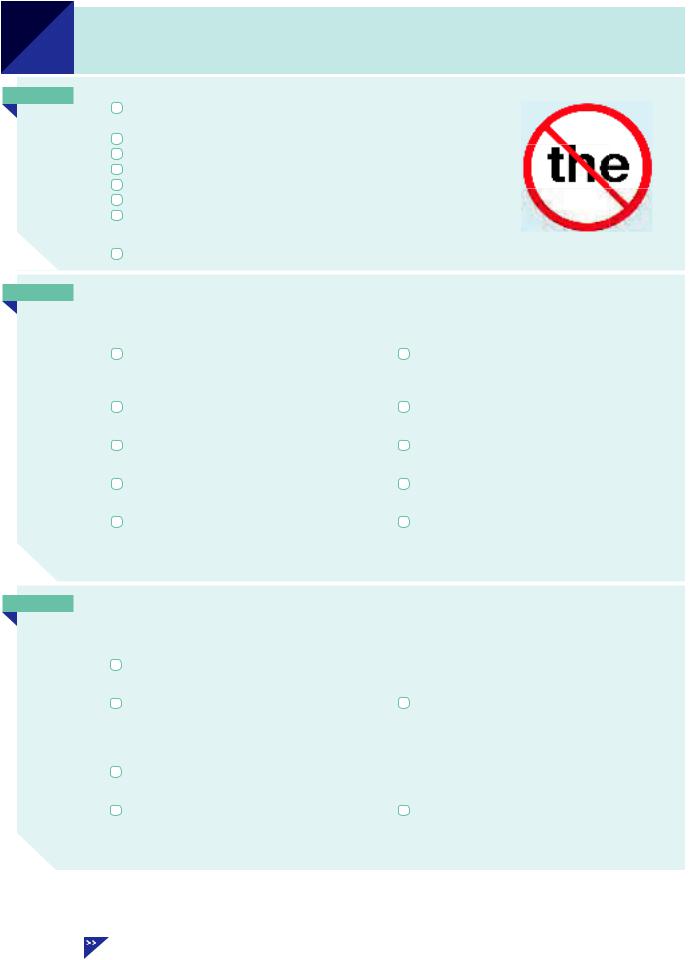
Unit
75 the 3 (children / the children)
AWhen we are talking about things or people in general, we do not use the:
I’m afraid of dogs. (not the dogs)
(dogs = dogs in general, not a specific group of dogs) Doctors are usually paid more than teachers.
Do you know anybody who collects stamps? Life has changed a lot in the last thirty years.
Do you like classical music / Chinese food / fast cars? My favourite sport is football/skiing/athletics.
My favourite subject at school was history/physics/English.
We say ‘most people / most shops / most big cities’ etc. (not the most …):
Most shops accept credit cards. (not The most shops)
BWe use the when we mean specific things or people.
Compare:
|
|
|
In general (without the) |
|
Specific people or things (with the) |
Children learn from playing. |
|
We took the children to the zoo. |
(= children in general) |
|
(= a specific group, perhaps the |
|
|
speaker’s children) |
I couldn’t live without music. |
|
The film wasn’t very good, but I liked |
|
|
the music. (= the music in the film) |
All cars have wheels. |
|
All the cars in this car park belong to |
|
|
people who work here. |
Sugar isn’t very good for you. |
|
Can you pass the sugar, please? |
|
|
(= the sugar on the table) |
English people drink a lot of tea. |
|
The English people I know drink a lot |
(= English people in general) |
|
of tea. (= only the English people I |
|
|
know, not English people in general) |
|
|
|
|
|
|
CThe diference between ‘something in general’ and ‘something specific’ is not always very clear.
Compare:
|
|
|
In general (without the) |
|
Specific people or things (with the) |
I like working with people. |
|
|
(= people in general) |
|
|
I like working with people who say |
|
I like the people I work with. |
what they think. |
|
(= a specific group of people) |
(not all people, but ‘people who say |
|
|
what they think’ is still a general idea) |
|
|
Do you like cofee? |
|
|
(= cofee in general) |
|
|
Do you like strong black cofee? |
|
The cofee we had ater dinner |
(not all cofee, but ‘strong black cofee’ is |
|
wasn’t very good. (= specific cofee) |
still a general idea) |
|
|
|
|
|
|
|
|
150 |
the 1–2 Units 73–74 the + adjective (the young / the English etc.) Unit 76 |
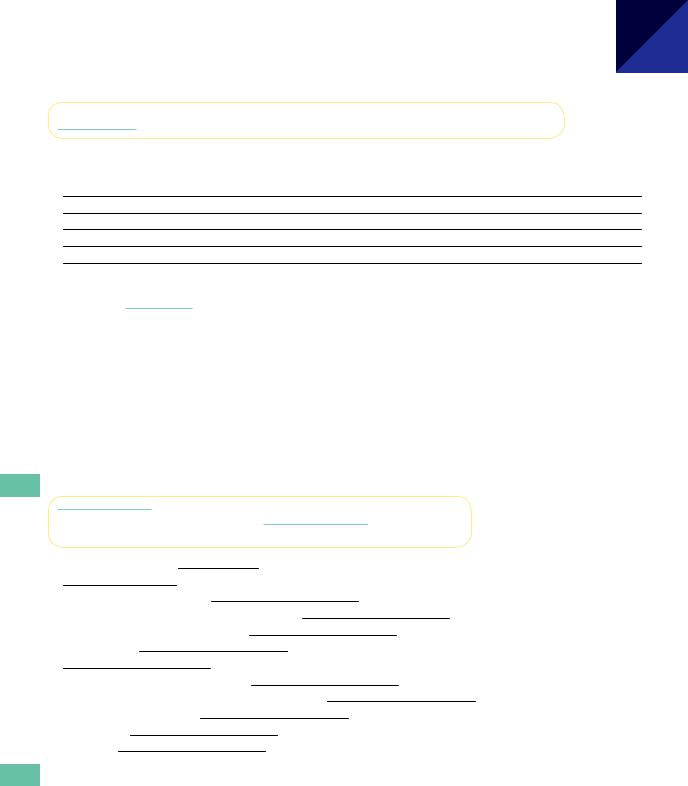
Exercises
75.1 |
Choose four of these things and write what you think about them: |
|
|||||||
|
|
bananas |
boxing |
cats |
crowds |
fast food |
horror movies |
||
|
|
hot weather |
maths |
opera |
snow |
supermarkets |
zoos |
||
|
Use: I like … / I don’t like … |
I think ... is/are … |
I don’t mind … |
||||||
|
|
I love … / I hate … |
I’m (not) interested in … |
|
|||||
1 |
I don’t like hot weather very much. |
|
|
||||||
2 |
|
|
|
|
|
|
|
|
|
3 |
|
|
|
|
|
|
|
|
|
4 |
|
|
|
|
|
|
|
|
|
5 |
|
|
|
|
|
|
|
|
|
|
|
|
|
|
|
|
|
||
75.2 |
Which is right? |
|
|
|
|
|
|
||
1 |
a Apples / |
The apples |
are good for you. (Apples is correct) |
|
|||||
|
|
b Look at apples / the apples on that tree. They’re very big. |
|
||||||
2 |
a Who are people / the people in this picture? |
|
|
||||||
|
|
b It annoys me when people / the people throw rubbish on the ground. |
|
||||||
3a My memory isn’t good. I’m not good at remembering names / the names. b What were names / the names of those people we met last night?
4a First World War / The First World War began in 1914 and ended in 1918. b A pacifist is somebody who is against war / the war.
5a He’s lazy. He doesn’t like hard work / the hard work.
b Did you finish work / the work you were doing yesterday?
75.3Complete the sentences using the following. Use the where necessary.
|
(the) basketball |
(the) grass |
(the) patience |
(the) people |
|
(the) questions |
(the) meat |
(the) information |
(the) hotels |
|
(the) biology |
(the) water |
(the) spiders |
(the) lies |
1 |
My favourite sport is |
basketball . |
|
|
2 |
The information |
we were given wasn’t correct. |
|
|
3 |
Some people are afraid of |
. |
|
|
4 |
A vegetarian is somebody who doesn’t eat |
. |
||
5 |
The test wasn’t hard. I answered |
|
without dificulty. |
|
6 |
Do you know |
|
who live in the flat next to yours? |
|
7 |
|
is the study of plants and animals. |
||
8 |
It’s better to tell the truth. Telling |
|
oten causes problems. |
|
9 |
We couldn’t find anywhere to stay in the town. |
were all full. |
||
10 |
Don’t swim in this pool. |
doesn’t look very clean. |
||
11 |
Don’t sit on |
|
. It’s wet ater the rain. |
|
12 |
You need |
|
to teach young children. |
|
75.4Which is right?
1 Steve is very good at telling stories / the stories.
2 I can’t sing this song. I don’t know words / the words.
3 Don’t stay in that hotel. It’s noisy and rooms / the rooms are very small.
4 I don’t have a car, so I use public transport / the public transport most of the time. 5 All books / All the books on the top shelf belong to me.
6 Life / The life is strange sometimes. Some very strange things happen. 7 We enjoyed our holiday. Weather / The weather was good.
8 Everybody needs water / the water to live.
9 I don’t like films / the films with unhappy endings.
Unit
75
Additional exercise 29 (page 319) |
151 |
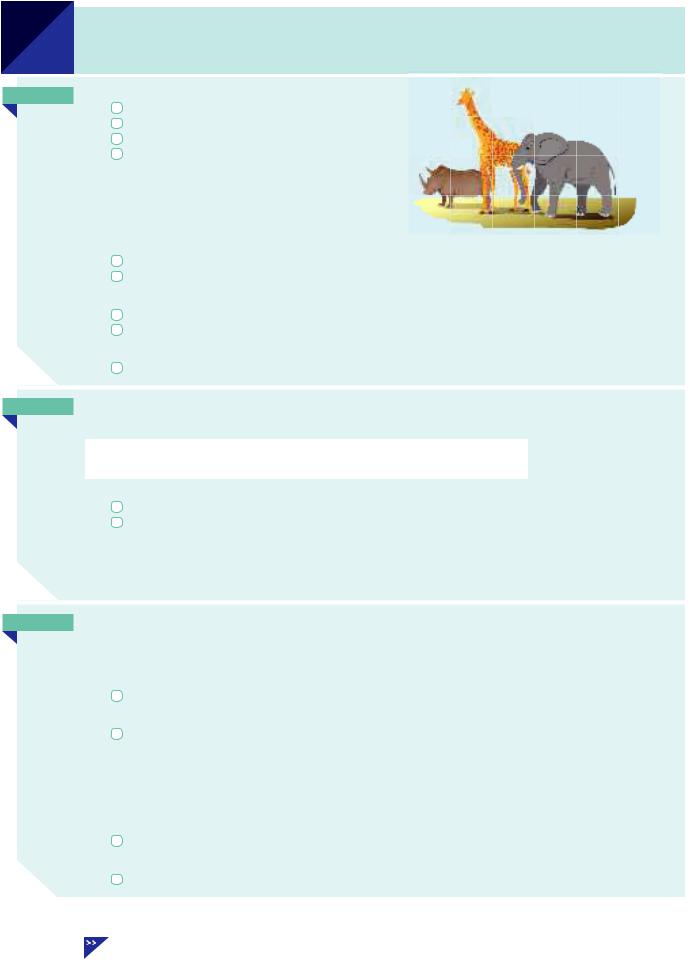
Unit
76 the 4 (the gira e / the telephone / the old etc.)
AStudy these sentences:
The girafe is the tallest of all animals.
The bicycle is an excellent means of transport.
When was the camera invented?
The dollar is the currency of the United States.
In these examples, the … does not mean one specific thing. The girafe = a specific type of animal, not a specific girafe. We use the … in this way to talk about a type of animal, machine etc.
In the same way we use the for musical instruments:
Can you play the guitar?
The piano is my favourite instrument.
Compare a and the: |
|
|
I’d like to have a piano. |
but |
I can’t play the piano. |
We saw a girafe at the zoo. but |
The girafe is my favourite animal. |
|
Note that man (without the) = human beings in general, the human race:
What do you know about the origins of man? (not the man)
Bthe old, the rich etc.
We use the + adjective (without a noun) to talk about groups of people. For example:
the old |
the rich |
the homeless |
the sick |
the elderly |
the poor |
the unemployed |
the injured |
|
|
|
|
the old = old people, the rich = rich people etc. :
Do you think the rich should pay higher taxes? We need to do more to help the homeless.
Note that we say: the old (not the olds), the poor (not the poors) etc.
The rich, the homeless etc. are plural. For one person, we say: a rich man (not a rich) a homeless person (not a homeless)
Cthe French, the Chinese etc.
We use the + a few nationality adjectives that end in -ch or -sh. For example: the French the Dutch the British the English the Spanish
The meaning is plural – the people of that country.
The French are famous for their food. (not French are …)
We do not say ‘a French’ or ‘an English’ (singular). For example, we say:
I met a French woman / an English guy.
We also use the + nationality words ending in -ese or -ss. For example: the Chinese the Portuguese the Swiss
These words can also be singular (a Chinese, a Swiss etc.).
With other nationality words, the plural ends in -s (usually without the). For example:
an Italian → Italians |
a Mexican → Mexicans |
a Thai → Thais |
Italians / Mexicans / Thais are very friendly. |
|
|
In all cases you can use adjective + people. For example, you can say:
French / Chinese / Mexican people are very friendly.
152 |
a/an and the Unit 72 the Units 73–75 Names with and without the Units 77–78 |
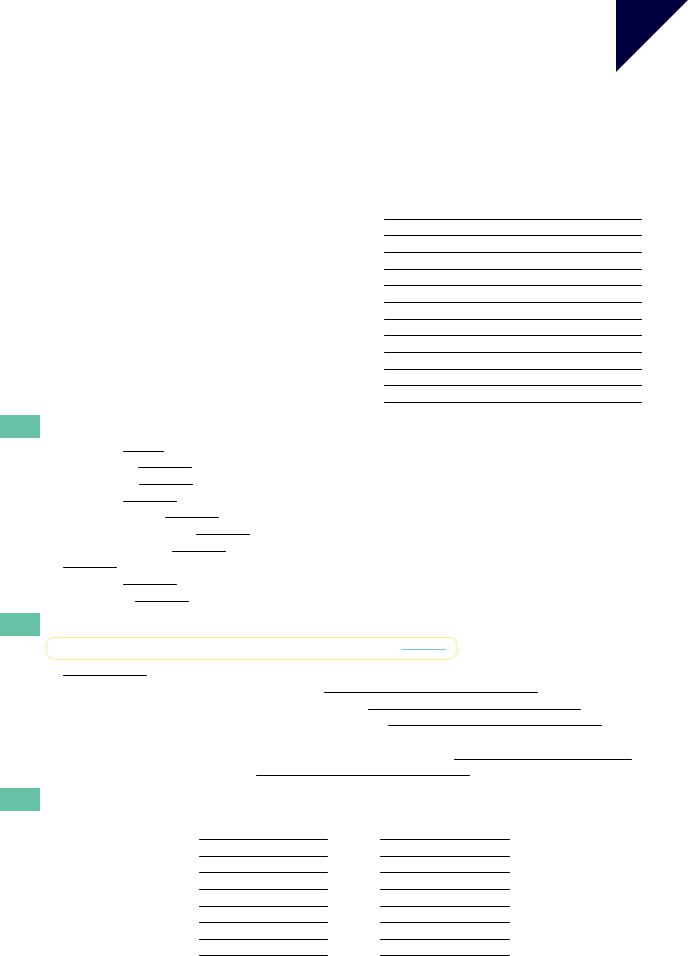
Exercises |
|
|
|
|
|
|
|
|
|
|
|
Unit |
||
|
|
|
|
|
|
|
|
|
|
76 |
||||
|
|
Answer the questions. Choose the right answer from the box. Don’t forget the. |
|
|
|
|||||||||
|
|
|
|
|||||||||||
76.1 |
|
|
|
|
||||||||||
1 |
|
2 |
|
3 |
|
4 |
|
|
|
|||||
|
|
|
|
|
|
|
|
|
|
|
|
|
|
|
|
|
animals |
|
|
birds |
|
|
inventions |
|
|
currencies |
|
|
|
|
|
tiger |
elephant |
|
eagle |
penguin |
|
telephone |
wheel |
|
dollar |
peso |
|
|
|
|
rabbit |
cheetah |
|
swan |
owl |
|
telescope |
laser |
|
euro |
rupee |
|
|
|
|
girafe |
kangaroo |
|
parrot |
pigeon |
|
helicopter |
typewriter |
|
rouble |
yen |
|
|
|
|
|
|
|
|
|
|
|
|
|
|
|
|
|
1 a |
Which of the animals is the tallest? |
the giraffe |
b |
Which animal can run the fastest? |
|
c |
Which of these animals is found in Australia? |
|
2a Which of these birds has a long neck? b Which of these birds cannot fly?
c Which bird flies at night?
3 a |
Which of these inventions is the oldest? |
b |
Which one is the most recent? |
c |
Which one was especially important for astronomy? |
4a What is the currency of India? b What is the currency of Canada?
c And the currency of your country?
76.2Put in the or a.
1 |
When was the |
telephone invented? |
|
2 |
Can you play |
|
musical instrument? |
3 |
Jessica plays |
|
violin in an orchestra. |
4 |
There was |
piano in the corner of the room. |
|
5 |
I wish I could play |
|
piano. |
6 |
Our society is based on |
family. |
|
7 |
Martin comes from |
|
large family. |
8computer has changed the way we live.
9 |
When was |
bicycle invented? |
10 |
Do you have |
car? |
76.3 Complete these sentences. Use the + adjective. Choose from:
|
elderly |
injured |
rich |
sick |
unemployed |
young |
|
1 |
The young have the future in their hands. |
|
|
||||
2 |
Helen is a nurse. She’s spent her life caring for |
|
. |
||||
3 |
Life is all right if you have a job, but things are hard for |
|
. |
||||
4 |
Ambulances arrived at the scene of the accident and took |
|
|
||||
|
to hospital. |
|
|
|
|
|
|
5 |
More and more people are living longer. How are we going to care for |
? |
|||||
6 |
It’s nice to have lots of money, but |
|
|
have their problems too. |
|||
76.4 What do you call the people of these countries?
|
|
one person (a/an …) |
the people in general |
1 |
Canada |
a Canadian |
Canadians |
2 |
Germany |
|
|
3 |
France |
|
|
4 |
Russia |
|
|
5 |
Japan |
|
|
6 |
Brazil |
|
|
7 |
England |
|
|
8 |
and your country |
|
|
153
